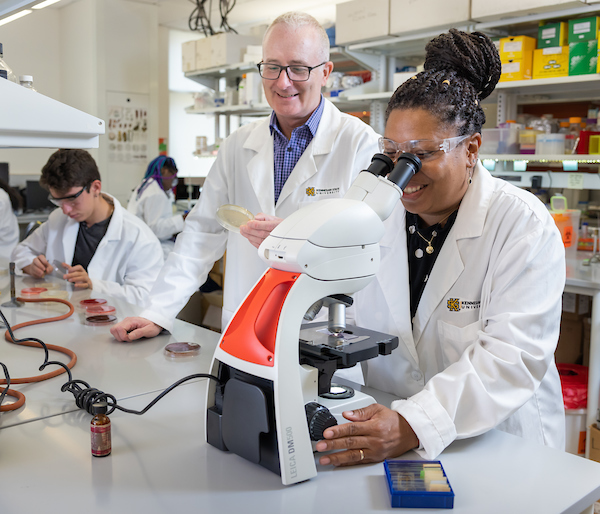Biochemistry
Learn more about Biochemistry
Admission Requirements
None.
This program does not have specific admission requirements. Only admission to Kennesaw State University is required to declare this major.
General Education Core IMPACTS Curriculum Recommendations for this Major
M: Students should take MATH 1113 or higher.
T: Students should take MATH 1179 or higher.
T: Select two course pairs from the following (8 Credit Hours): CHEM 1211/L, CHEM 1212/L, PHYS 1111/L*, PHYS 1112/L, PHYS 2211/L*, PHYS 2212/L, BIOL 1107/L, or BIOL 1108/L. *Students cannot take both PHYS 1111/L and PHYS 2211/L nor PHYS 1112/L and PHYS 2212/L.
Related Minors or Certificates Available
- Biology Minor
- Chemistry Minor
Sample Classes
-
CHEM 3105: Inorganic Chemistry
In-depth study of concepts and theories of inorganic chemistry. Topics include atomic structure, bonding, coordination chemistry, reaction mechanisms, symmetry, and a general survey of descriptive inorganic chemistry.
-
CHEM 3501: Biochemistry I: Structure and Function of Biological Macromolecules
Chemistry and biochemistry of macromolecules: proteins, carbohydrates, lipids, and nucleic acids. Introduction to enzymes.
-
CHEM 3601: Physical Chemistry: Quantum Chemistry and Spectroscopy
This course provides an introduction to quantum mechanics and its application to selected chemical systems, atomic structure, chemical bonding, atomic, rotational, vibrational, and electronic spectroscopy.
-
CHEM 4500K: Methods in Nucleic Acid and Protein Biochemistry
This course covers the chemical aspects of biochemical techniques routinely performed in the study of DNA, RNA, and protein. This course will build upon and complement the information on proteins and enzymes covered in biochemistry courses and the basic understanding of DNA, RNA, replication, transcription, and translation that students learn in biochemistry, genetics and other biology courses. The laboratory component of this course provides an opportunity for multi-week projects that combine methods learned in previous courses with new methods, and as such it serves as a capstone experience in biochemical methodology.












